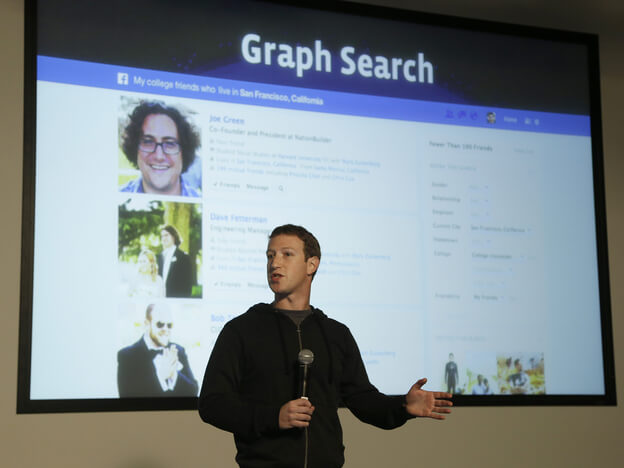
See why top ecommerce brands use Miva’s no-code platform to run
multiple stores, manage massive catalogs, and grow their revenue.
Facebook CEO Mark Zuckerberg speaks at Facebook headquarters in Menlo Park, California, on Tuesday. Photo: JeffChiu/AP
Facebook has now over a billion users and has collected countless amounts of information about each user. Now, Facebook is putting all that information to use by creating a personalized search that will ‘read’ each individual based on their preferences and friends’ preferences to create the ultimate search engine.
This week, Facebook has launched a test that they are calling Search Graph. It will be primarily a search engine made specifically for the social network that will provide a more personalized search than ever before. The types of questions that they can solve are questions that you wouldn’t typically think to ask of a search engine. You will be able to ask questions such as, “What clothing stores do my friends like?”
Facebook Graph Search will no doubt leverage member data to provide advertisers with more targeted, personalized advertising opportunities going forward.”
The interesting part about this is that it will create different answers than that of Google or Bing. Facebook’s new search engine is going to change the way that Facebook users find their information and connect with people, places, and things. “In web search it is very often the case that if you do a search for ‘apple’ and I do a search for ‘apple,’ we’re basically going to get the same results,” says Kari Lee, Engineering Manager, in a video Facebook released this week. “Maybe I’ll get slightly more technical results based on Apple computers and maybe you’ll care about the fruit a little bit more but [the results] are not that different from each other. Whereas, on Facebook, when [we] do the same searches we’ll get completely different sets of results because of the depth of personalization that we do.” This sort of personalization will be based on the user’s personal connections. For example, if I lived in San Diego and searched for restaurants within my city, the top search results would likely be ones that are popular with my closest friends. The search engine also takes into account my existing likes and interests, ranking the results similar to my personal preferences higher.
Due to the recent consumer privacy policy change, the product’s results may change. For example, if a user doesn’t publically share the stores or restaurants he/she has visited on Facebook, that information will not appear in results. The more active a retailer’s fan base is, the more likely it is that the brand’s page will appear in consumer search results, says Andreas Pouros, COO at London-based digital marketing agency Greenlight.
So, How can retailers optimize their Facebook presence for this new search? Rebecca Lieb, digital advertising analyst at research and advisory firm Altimeter Group, advises retailers to create local pages to show up in questions containing locations. “It is just like search engine optimization,” she says. “Retailers have to get their house in order. They have to do basic SEO practices like making sure their photos are properly tagged so that the data is findable.”
Sponsored Results is the only active search-related ad unit at this time. It enables marketers to pay to have their listing appear high up in search results. This will continue to appear regardless of whether consumers are part of the Search Graph test, says a Facebook spokeswoman.

Sponsored Results will not change
Analysts are predicting that there will be more ad units in the future. “Before the arrival of Facebook’s Search Graph the search function on Facebook was basic and, as such, a wasted opportunity given Facebook’s imperative to strengthen advertising revenues,” says Eden Zoller, principal analyst at international research firm Ovum. “Facebook Graph Search will no doubt leverage member data to provide advertisers with more targeted, personalized advertising opportunities going forward.”
“That’s a natural direction for Facebook to go to make its site more useful,” says analyst Colin Sebastian at Baird Equity Research. “Obviously the process of searching an enormous amount of unstructured user data isn’t easy, but search is a core part of any web platform,” he says. “Improved search should help Facebook monetize user traffic more effectively.”
The new search is going to be rolled out slowly over the next few months. Facebook CEO, Mark Zuckerberg, said that Graph Search is not available on mobile devices at this time. This new feature is currently “in Beta,” but improvements will be coming.
To sign up for Graph Search, join the waiting list here.
Information was derived from InternetRetailer.com
Back to top
No worries, download the PDF version now and enjoy your reading later...
Download PDF Miva
Miva
Miva offers a flexible and adaptable ecommerce platform that evolves with businesses and allows them to drive sales, maximize average order value, cut overhead costs, and increase revenue. Miva has been helping businesses realize their ecommerce potential for over 20 years and empowering retail, wholesale, and direct-to-consumer sellers across all industries to transform their business through ecommerce.
Visit Website